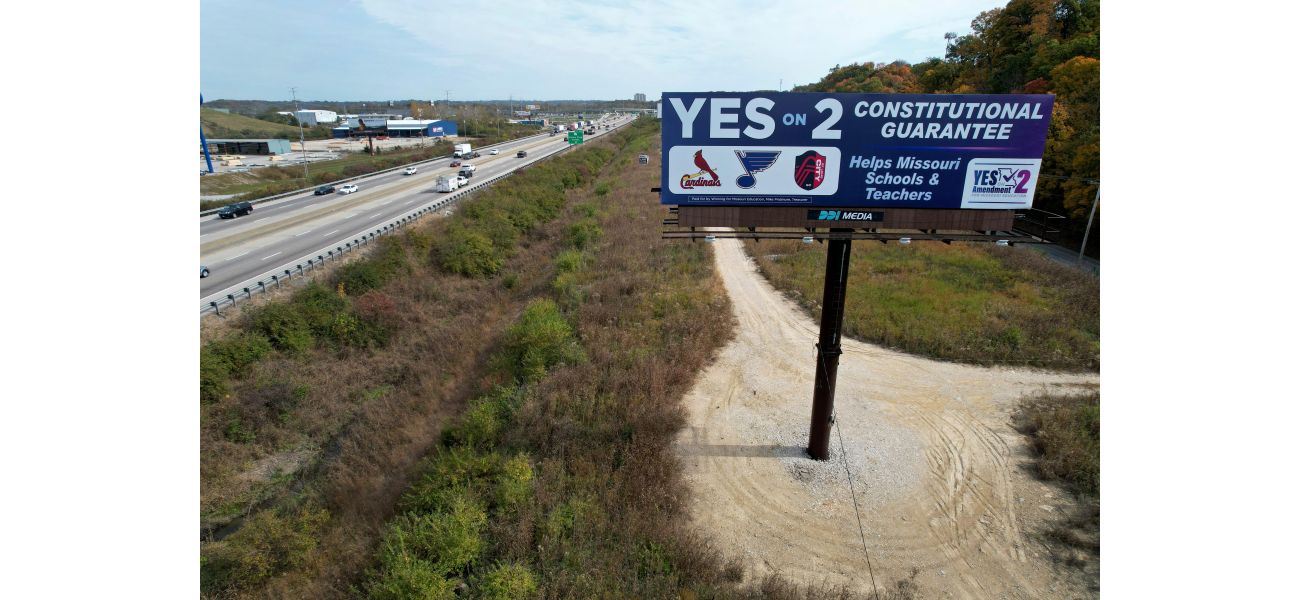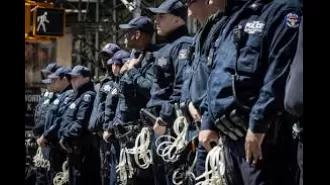Missouri's vote on sports betting raises questions about how tax rates should be determined in the larger debate across the country.
Ads pushing Missouri sports betting measure promise school funding from taxes. If passed, expect more ads with deals for bettors.
October 27th 2024.

In the city of Jefferson, Missouri, there is a lot of talk about a ballot measure that could legalize sports betting in the state. The main selling point of this measure is the potential for millions of dollars in new tax revenue that could go towards education. But with the possibility of the measure passing, it is likely that we will also see a surge in advertisements promoting special deals and promotions for sports bettors.
However, there is a catch. Many of these promotional costs, where sportsbooks offer credits or bonuses for customers to place bets, will not be subject to state taxes. This means that the revenue for education may not be as significant as originally promised. This issue highlights a larger debate among policymakers about how to tax the rapidly growing sports betting industry, which has now spread to 38 states and Washington D.C. since the U.S. Supreme Court's ruling in 2018.
According to Brent Evans, an assistant finance professor at Georgia College & State University, this is a new industry and there is no clear answer on what a reasonable tax rate should be. As more states have legalized sports betting, some have already raised or restructured their tax rates. For example, Illinois, Ohio, Tennessee, and Washington D.C. have all made changes to their tax rates, while Colorado and Virginia have reduced their tax deductions.
Currently, tax rates for sports betting range from 6.75% in states like Iowa to 51% in states like New York. However, this gap is even wider when you consider that some states allow deductions for promotional bets while others do not. Approximately half of the states allow these deductions, as it is a common tactic to entice bettors to continue placing bets. But in the short-term, this can decrease the amount of tax revenue available for governments and schools.
In Missouri, the proposed 10% tax rate on sports betting revenue is below the national average of 19% that sportsbooks paid to states last year. This is due to the fact that promotional bets can be deducted from taxable revenue, potentially resulting in some months where sportsbooks owe nothing to the state. The proposed constitutional amendment acknowledges this possibility and allows for negative balances to be carried over until revenue increases enough to owe taxes.
Although Missouri's amendment caps the amount of promotional credits that can be deducted at 25% of all wagers, this may not have a significant impact. An analysis conducted by consultant Eilers & Krejcik Gaming for amendment supporters projects that promotional bets will only make up around 8% of total wagers in the first year of sports betting, and will decrease over time.
According to Jack Cardetti, a spokesman for Winning for Missouri Education (the group backing the measure), the Missouri proposal is in line with what has been effective in other states. He cites Colorado as an example, where sports betting was launched in 2020 with a 10% tax rate and full deductions for promotional bets. In its first full fiscal year, Colorado saw $2.7 billion in total bets and yielded $8.1 million in taxes, slightly below legislative projections. However, the state has since changed its law to cap promotional tax deductions at 2.5% of total bets, gradually declining to 1.75% by 2026. As a result, sports betting tax revenue in Colorado has increased to over $30 million in the most recent fiscal year, leading lawmakers to propose a ballot measure to allow the state to keep more than the original $29 million cap.
Richard Auxier, a principal policy associate at the nonprofit Tax Policy Center, believes that capping tax deductions for promotional bets is a good step. However, he questions why some states even allow these deductions in the first place. He argues that this is essentially subsidizing gambling and raises the question of whether states should be encouraging people to gamble through their tax policies.
The Missouri amendment was placed on the November ballot by initiative petition after legislation to legalize sports betting repeatedly stalled in the state Senate. The campaign for the measure, which has a record-breaking budget of $43 million, is funded entirely by DraftKings and FanDuel, two companies that dominate the sports betting market. If the measure passes, these companies could apply for two statewide licenses to conduct online sports betting. The amendment also authorizes additional sports betting licenses for Missouri casinos and professional sports teams. On the other hand, the opposition campaign, which has a budget of $14 million, is funded entirely by Caesars Entertainment, a company that operates three of Missouri's 13 casinos. While Caesars generally supports sports betting, it opposes the way this measure is written.
One concern raised by opponents is that online sports betting could negatively impact physical casinos. While research on this topic is limited, a study of seven states found that casino gambling revenue declined as online sports betting increased. Brooke Foster, a spokesperson for the opposition group Missourians Against the Deceptive Online Gambling Amendment, believes that there will be a shift from placing bets at physical casinos to betting through online apps, which could have a negative impact on local casinos.
The impact of different tax rates can be seen in states like Illinois and New Jersey, which were at the forefront of the legal sports betting movement. Both states saw between $11.5 billion and $12 billion in sports bets last year, resulting in $1 billion in revenue for sportsbooks after payouts to customers. However, New Jersey took in $129 million in tax revenue with a 14.25% tax rate for online bets and a 9.75% tax rate for bets at casinos and racetracks, with some promotional deductions. In comparison, Illinois took in $162 million in tax revenue with a 15% tax rate and no promotional deductions. Despite concerns raised by some sportsbook representatives, there has been no evidence of operators leaving Illinois due to the increase in tax rates.
According to Joe Weinert, executive vice president of Spectrum Gaming Group, a consulting firm, sports betting operators compete vigorously for bettors by offering attractive odds and promotions. Ultimately, the success of sports betting in Missouri will depend on the choices made by voters in the upcoming election.
However, there is a catch. Many of these promotional costs, where sportsbooks offer credits or bonuses for customers to place bets, will not be subject to state taxes. This means that the revenue for education may not be as significant as originally promised. This issue highlights a larger debate among policymakers about how to tax the rapidly growing sports betting industry, which has now spread to 38 states and Washington D.C. since the U.S. Supreme Court's ruling in 2018.
According to Brent Evans, an assistant finance professor at Georgia College & State University, this is a new industry and there is no clear answer on what a reasonable tax rate should be. As more states have legalized sports betting, some have already raised or restructured their tax rates. For example, Illinois, Ohio, Tennessee, and Washington D.C. have all made changes to their tax rates, while Colorado and Virginia have reduced their tax deductions.
Currently, tax rates for sports betting range from 6.75% in states like Iowa to 51% in states like New York. However, this gap is even wider when you consider that some states allow deductions for promotional bets while others do not. Approximately half of the states allow these deductions, as it is a common tactic to entice bettors to continue placing bets. But in the short-term, this can decrease the amount of tax revenue available for governments and schools.
In Missouri, the proposed 10% tax rate on sports betting revenue is below the national average of 19% that sportsbooks paid to states last year. This is due to the fact that promotional bets can be deducted from taxable revenue, potentially resulting in some months where sportsbooks owe nothing to the state. The proposed constitutional amendment acknowledges this possibility and allows for negative balances to be carried over until revenue increases enough to owe taxes.
Although Missouri's amendment caps the amount of promotional credits that can be deducted at 25% of all wagers, this may not have a significant impact. An analysis conducted by consultant Eilers & Krejcik Gaming for amendment supporters projects that promotional bets will only make up around 8% of total wagers in the first year of sports betting, and will decrease over time.
According to Jack Cardetti, a spokesman for Winning for Missouri Education (the group backing the measure), the Missouri proposal is in line with what has been effective in other states. He cites Colorado as an example, where sports betting was launched in 2020 with a 10% tax rate and full deductions for promotional bets. In its first full fiscal year, Colorado saw $2.7 billion in total bets and yielded $8.1 million in taxes, slightly below legislative projections. However, the state has since changed its law to cap promotional tax deductions at 2.5% of total bets, gradually declining to 1.75% by 2026. As a result, sports betting tax revenue in Colorado has increased to over $30 million in the most recent fiscal year, leading lawmakers to propose a ballot measure to allow the state to keep more than the original $29 million cap.
Richard Auxier, a principal policy associate at the nonprofit Tax Policy Center, believes that capping tax deductions for promotional bets is a good step. However, he questions why some states even allow these deductions in the first place. He argues that this is essentially subsidizing gambling and raises the question of whether states should be encouraging people to gamble through their tax policies.
The Missouri amendment was placed on the November ballot by initiative petition after legislation to legalize sports betting repeatedly stalled in the state Senate. The campaign for the measure, which has a record-breaking budget of $43 million, is funded entirely by DraftKings and FanDuel, two companies that dominate the sports betting market. If the measure passes, these companies could apply for two statewide licenses to conduct online sports betting. The amendment also authorizes additional sports betting licenses for Missouri casinos and professional sports teams. On the other hand, the opposition campaign, which has a budget of $14 million, is funded entirely by Caesars Entertainment, a company that operates three of Missouri's 13 casinos. While Caesars generally supports sports betting, it opposes the way this measure is written.
One concern raised by opponents is that online sports betting could negatively impact physical casinos. While research on this topic is limited, a study of seven states found that casino gambling revenue declined as online sports betting increased. Brooke Foster, a spokesperson for the opposition group Missourians Against the Deceptive Online Gambling Amendment, believes that there will be a shift from placing bets at physical casinos to betting through online apps, which could have a negative impact on local casinos.
The impact of different tax rates can be seen in states like Illinois and New Jersey, which were at the forefront of the legal sports betting movement. Both states saw between $11.5 billion and $12 billion in sports bets last year, resulting in $1 billion in revenue for sportsbooks after payouts to customers. However, New Jersey took in $129 million in tax revenue with a 14.25% tax rate for online bets and a 9.75% tax rate for bets at casinos and racetracks, with some promotional deductions. In comparison, Illinois took in $162 million in tax revenue with a 15% tax rate and no promotional deductions. Despite concerns raised by some sportsbook representatives, there has been no evidence of operators leaving Illinois due to the increase in tax rates.
According to Joe Weinert, executive vice president of Spectrum Gaming Group, a consulting firm, sports betting operators compete vigorously for bettors by offering attractive odds and promotions. Ultimately, the success of sports betting in Missouri will depend on the choices made by voters in the upcoming election.
[This article has been trending online recently and has been generated with AI. Your feed is customized.]
[Generative AI is experimental.]
0
0
Submit Comment





